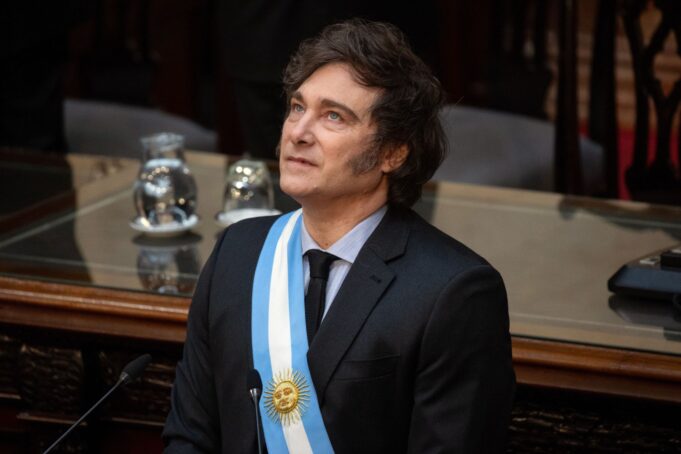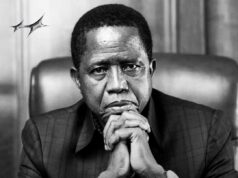Javier Milei (born October 22, 1970, Buenos Aires, Argentina) is a confrontational right-wing outsider who rose to the presidency of Argentina in 2023 on a tide of voter dissatisfaction with a political elite whom his supporters blamed for endemic hyperinflation, a currency in free fall, and increasing poverty. A libertarian economist who describes himself as an anarcho-capitalist, Milei first came to national prominence as a flamboyant television pundit and outspoken critic of the country’s ruling class. His brash personality and antiestablishment approach brought comparisons to former presidents Donald Trump of the United States and Jair Bolsonaro of Brazil.
Early life and education
The son of Alicia Lujan Lucich, a homemaker, and Norberto Horacio Milei, a bus driver of Italian descent who became a successful entrepreneur, Javier Milei grew up in the upper-middle-class Villa Devoto neighborhood of Buenos Aires. He has described his childhood as troubled and said that he had a complicated relationship with his parents, who reportedly physically and verbally abused him and with whom, as an adult, he ceased talking for some 10 years. Support during his early years came from his maternal grandmother and his younger sister, Karina Milei, who has long played a pivotal role in his life. As a schoolboy he earned the nickname “El Loco” (the Madman) for his aggressive rhetoric, outspokenness, and anger. Early on his passions were music and football (soccer). He was the lead vocalist for a Rolling Stones cover band and an accomplished goalie for teams in the lower ranks of the Chacarita Juniors football club.
Deeply affected by hyperinflation’s disruption of life in Argentina, during the late 1980s he put music and football behind him to study economics. While at the University of Belgrano, Milei immersed himself in Keynesian economics and worked as an intern at the Central Bank. After obtaining an economics degree, he continued his studies with graduate work at the Institute of Economic and Social Development and Torcuato Di Tella University, earning a pair of master’s degrees. In the process Milei became disillusioned with Keynesianism, especially after his exposure to the libertarian thought of Murray Rothbard, who framed the political-economic theory of anarcho-capitalism, which advocates for the voluntary exchange of goods and services in a society broadly regulated by the market rather than by the state. Milei then explored the ideas of the classical liberal economists F.A. Hayek and Ludwig von Mises of the Austrian school of economics and came to view government regulation of the economy, generous spending, and high taxation as detrimental to a country’s economic success.
Economics career
After completing his formal education, Milei began a career in the private sector as an economist, working for HSBC Argentina, one of the country’s largest banks, and as the head economist of Máxima AFJP, the private pension fund created in the 1990s by then economy minister Domingo Cavallo, which served as a major component of Argentina’s social security system until that responsibility was fully returned to the state in 2008. That year Milei became an economist and financial analyst for Corporación América, the large conglomerate controlled by billionaire Eduardo Eurnekian, which has interests in the energy, infrastructure, and agribusiness sectors in addition to operating the majority of Argentina’s airports. Milei also served as the chief economist for a think tank, Fundación Acordar, and as a university professor. Controversially, earlier in his career Milei acted as an adviser to Antonio Bussi, a former general who in 2008 would be sentenced to life in prison for his role in Argentina’s Dirty War (1976–83), during Bussi’s term as governor (1995–99) of Tucumán province.
Over-the-top television punditry
In the mid-2010s Milei began appearing on television as a pundit discussing economics and politics. He railed against the administrations of presidents Cristina Fernández de Kirchner, Mauricio Macri, and Alberto Fernández and denounced the country’s ruling political elite in angry, expletive-laden rants, characterizing them as corrupt thieves and branding them “the political caste.” As his TV appearances became increasingly flamboyant and theatrical, his fame grew. On one occasion he smashed a piñata representing Argentina’s Central Bank. On another, he assumed the role of a masked, costumed alter-ego super hero, General Ancap, the leader of the fictitious “Liberland” (a country without taxes) breaking into operatic song about the perils of the Argentine economy. By 2018 he had become an ever more frequent guest on television and radio shows, invited as much for his entertainment value as for his insight and indignation. With the onset of the COVID-19 global pandemic, Milei gained further attention by criticizing the government’s handling of the outbreak and expressing skepticism regarding the COVID-19 vaccine.
Entry into politics and presidential run
Encouraged by supporters to enter politics, in 2021 Milei formed a new political coalition, La Libertad Avanza (“Liberty Advances”), and ran for and won election to a seat representing the city of Buenos Aires in the Chamber of Deputies, the federal government’s lower house. Once in office, he seemed little interested in participating in the business of government, but he kept himself in the public eye by raffling off his salary to supporters every month on social media. Seemingly intent on establishing himself as a player within the international far right, in June 2022 he attended the Conservative Political Action Conference (CPAC) Brazil in Campinas, where he was welcomed by Brazilian Congressman Eduardo Bolsonaro, a son of authoritarian former Brazilian president Jair Bolsonaro. As Milei became more prominent and his aspiration to the Argentine presidency more apparent, the media began comparing his flamboyant, pugnacious outsider style and antiestablishment ambitions to the right-wing populism of ex-president Bolsonaro and former U.S. president Donald Trump.




